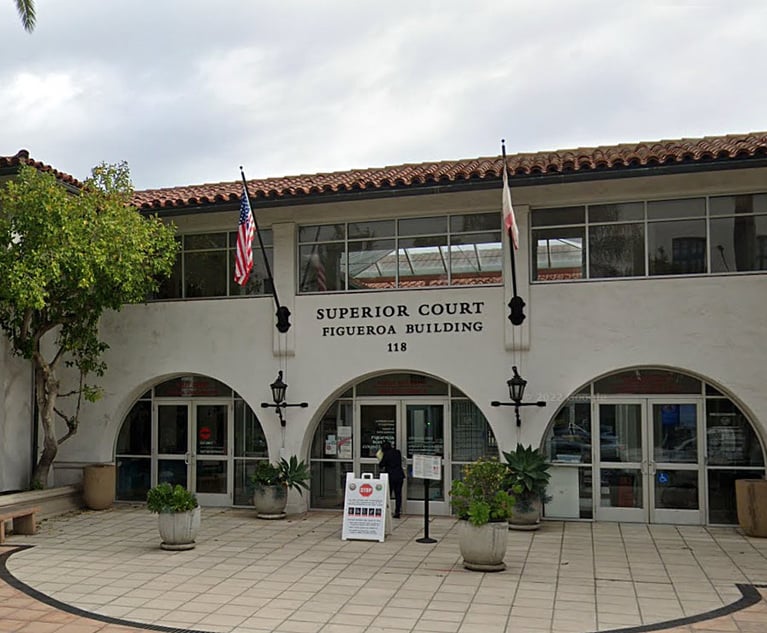 Tent on the sidewalk in San Francisco. (Photo: Jason Doiy/ALM)
Tent on the sidewalk in San Francisco. (Photo: Jason Doiy/ALM)Another Lawsuit Targets San Francisco Over 'Insufferable' Conditions in the Tenderloin Neighborhood
Dowling & Marquez in San Francisco is representing real estate investors who claim the sidewalks in the neighborhood during the COVID-19 outbreak have become "unsanitary, unsafe and often impassable."
June 26, 2020 at 06:55 PM
4 minute read
The owners of apartment buildings in San Francisco's Tenderloin neighborhood are suing the city and county of San Francisco for treating the working-class neighborhood as a "containment zone" for its drug and homelessness issues, creating unsanitary and unsafe conditions that have worsened during the coronavirus pandemic.
The complaint, filed in the U.S. District Court for the Northern District of California on Friday, follows a similar lawsuit brought by a group of Tenderloin businesses, as well as the University of California, Hastings College of the Law.
Dowling & Marquez in San Francisco is representing Daniel, James and Richard Giosso, which own a mixed-use building in the Tenderloin, and Mike O'Neill and Sons, which own two different apartment buildings in the neighborhood.
"What has long been suffered in the Tenderloin has become insufferable," wrote Dowling & Marquez's Curtis Dowling and Jak Marquez in language echoing the earlier suit. "The conditions now prevailing in the neighborhood constitute a violation of the fundamental civil rights of those residing and working there."
The real estate investors claim that the city and county have violated their due process and equal protection rights and that the city's negligence has created a public nuisance, mirroring allegations UC Hastings made in its lawsuit. They assert that the neighborhood's sidewalks have become "unsanitary, unsafe and often impassable."
In a May filing, lawyers at Walkup, Melodia, Kelly & Schoenberger in San Francisco and Greenberg Gross in Los Angeles wrote that UC Hastings and the coalition of businesses had reached an agreement with the city to settle the 14 claims laid out in the suit. As part of a stipulated injunction, which has yet to be approved by the San Francisco's Board of Supervisors and U.S. District Judge Jon Tigar of the Northern District of California, the city would relocate up to 300 tents and encampments in the Tenderloin to hotels, safe sleeping villages outside the neighborhood or off-street locations such as parking lots by July 20.
Plans to remove the neighborhood's homeless population have been opposed by a group of more than 125 UC Hastings students, who wrote a letter to Chancellor and Dean David Faigman claiming the lawsuit "defines the community in a way that implicitly excludes our unhoused neighbor."
On Wednesday, the American Civil Liberties Union filed an amicus brief in support of intervening groups advocating for the unhoused individuals in the community.
"The proposed settlement threatens to push from the City the very individuals who could most benefit from the resources and support available in San Francisco and in the Tenderloin specifically," said Abre' Conner, staff attorney at the ACLU Foundation of Northern California, in a statement. "Before considering any proposed settlement, the Court should consider the perspective of individuals, specifically Black and TGI individuals, who are the direct targets of this case and of the proposed settlement."
Read More:
This content has been archived. It is available through our partners, LexisNexis® and Bloomberg Law.
To view this content, please continue to their sites.
Not a Lexis Subscriber?
Subscribe Now
Not a Bloomberg Law Subscriber?
Subscribe Now
NOT FOR REPRINT
© 2024 ALM Global, LLC, All Rights Reserved. Request academic re-use from www.copyright.com. All other uses, submit a request to [email protected]. For more information visit Asset & Logo Licensing.
You Might Like
View All


Santa Barbara Judge Accused of Moonlighting as Attorney for Secretary/Girlfriend
4 minute readLaw Firms Mentioned
Trending Stories
Who Got The Work
Michael G. Bongiorno, Andrew Scott Dulberg and Elizabeth E. Driscoll from Wilmer Cutler Pickering Hale and Dorr have stepped in to represent Symbotic Inc., an A.I.-enabled technology platform that focuses on increasing supply chain efficiency, and other defendants in a pending shareholder derivative lawsuit. The case, filed Oct. 2 in Massachusetts District Court by the Brown Law Firm on behalf of Stephen Austen, accuses certain officers and directors of misleading investors in regard to Symbotic's potential for margin growth by failing to disclose that the company was not equipped to timely deploy its systems or manage expenses through project delays. The case, assigned to U.S. District Judge Nathaniel M. Gorton, is 1:24-cv-12522, Austen v. Cohen et al.
Who Got The Work
Edmund Polubinski and Marie Killmond of Davis Polk & Wardwell have entered appearances for data platform software development company MongoDB and other defendants in a pending shareholder derivative lawsuit. The action, filed Oct. 7 in New York Southern District Court by the Brown Law Firm, accuses the company's directors and/or officers of falsely expressing confidence in the company’s restructuring of its sales incentive plan and downplaying the severity of decreases in its upfront commitments. The case is 1:24-cv-07594, Roy v. Ittycheria et al.
Who Got The Work
Amy O. Bruchs and Kurt F. Ellison of Michael Best & Friedrich have entered appearances for Epic Systems Corp. in a pending employment discrimination lawsuit. The suit was filed Sept. 7 in Wisconsin Western District Court by Levine Eisberner LLC and Siri & Glimstad on behalf of a project manager who claims that he was wrongfully terminated after applying for a religious exemption to the defendant's COVID-19 vaccine mandate. The case, assigned to U.S. Magistrate Judge Anita Marie Boor, is 3:24-cv-00630, Secker, Nathan v. Epic Systems Corporation.
Who Got The Work
David X. Sullivan, Thomas J. Finn and Gregory A. Hall from McCarter & English have entered appearances for Sunrun Installation Services in a pending civil rights lawsuit. The complaint was filed Sept. 4 in Connecticut District Court by attorney Robert M. Berke on behalf of former employee George Edward Steins, who was arrested and charged with employing an unregistered home improvement salesperson. The complaint alleges that had Sunrun informed the Connecticut Department of Consumer Protection that the plaintiff's employment had ended in 2017 and that he no longer held Sunrun's home improvement contractor license, he would not have been hit with charges, which were dismissed in May 2024. The case, assigned to U.S. District Judge Jeffrey A. Meyer, is 3:24-cv-01423, Steins v. Sunrun, Inc. et al.
Who Got The Work
Greenberg Traurig shareholder Joshua L. Raskin has entered an appearance for boohoo.com UK Ltd. in a pending patent infringement lawsuit. The suit, filed Sept. 3 in Texas Eastern District Court by Rozier Hardt McDonough on behalf of Alto Dynamics, asserts five patents related to an online shopping platform. The case, assigned to U.S. District Judge Rodney Gilstrap, is 2:24-cv-00719, Alto Dynamics, LLC v. boohoo.com UK Limited.
Featured Firms
Law Offices of Gary Martin Hays & Associates, P.C.
(470) 294-1674
Law Offices of Mark E. Salomone
(857) 444-6468
Smith & Hassler
(713) 739-1250







